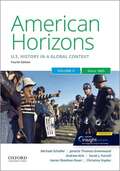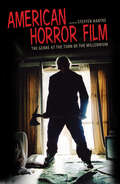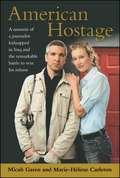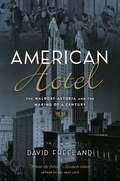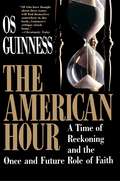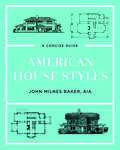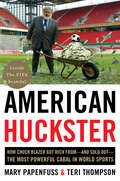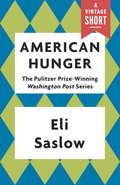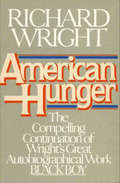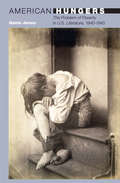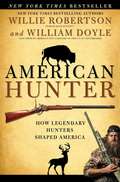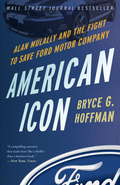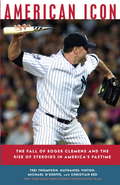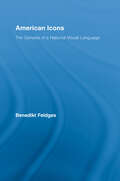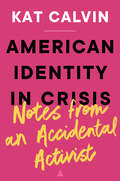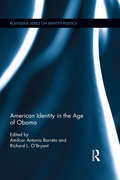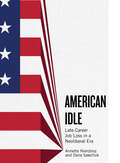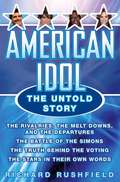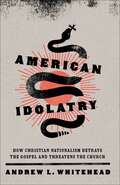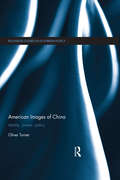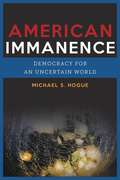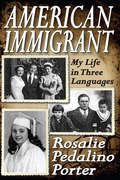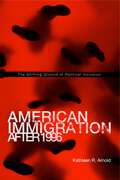- Table View
- List View
American Horizons: Us History In A Global Context, Volume Two: Since 1865
by Michael Schaller Janette Thomas Greenwood Christina Snyder Aaron Sheehan-Dean Andrew Kirk Sarah J. PurcellIn American Horizons: U.S. History in a Global Context, Fourth Edition, the authors use the frequent movement of people, goods, and ideas into, out of, and within America's borders as a framework. This unique approach provides a fully integrated global perspective that seamlessly contextualizes American events within the wider world. Presented in two volumes for maximum flexibility--and supplemented by two sourcebooks of primary documents--American Horizons illustrates the relevance of U.S. history to students by centering on the matrix of issues that dominate their lives.
American Horror Film: The Genre at the Turn of the Millennium
by Steffen HantkeCreatively spent and politically irrelevant, the American horror film is a mere ghost of its former self—or so goes the old saw from fans and scholars alike. Taking on this undeserved reputation, the contributors to this collection provide a comprehensive look at a decade of cinematic production, covering a wide variety of material from the last ten years with a clear critical eye. Individual essays profile the work of up-and-coming director Alexandre Aja and reassess William Malone’s much-maligned Feardotcom in the light of the torture debate at the end of President George W. Bush’s administration. Other essays look at the economic, social, and formal aspects of the genre; the globalization of the US film industry; the alleged escalation of cinematic violence; and the massive commercial popularity of the remake. Some essays examine specific subgenres—from the teenage horror flick to the serial killer film and the spiritual horror film—as well as the continuing relevance of classic directors such as George A. Romero, David Cronenberg, John Landis, and Stuart Gordon. Essays deliberate on the marketing of nostalgia and its concomitant aesthetic and on the curiously schizophrenic perspective of fans who happen to be scholars as well. Taken together, the contributors to this collection make a compelling case that American horror cinema is as vital, creative, and thought-provoking as it ever was.
American Hostage: A Memoir of a Journalist Kidnapped in Iraq and the Remarkable Battle to Win His Release
by Micah Garen Marie-Helene CarletonA rare and powerful story of hope, love, survival,and the struggle to bring back alive a hostage in Iraq Micah Garen and Marie-Hélène Carleton were journalists and filmmakers working in Iraq on a documentary about the looting of the country's legendary archaeological sites, with their Iraqi translator Amir Doshi. In the late summer of 2004, they began to wrap up their work, and Marie-Hélène returned home while Micah remained for a final two weeks of filming. As Micah and Amir were filming in a Nasiriyah market, something went horribly wrong: Micah, who wore a bushy mustache and was dressed in Iraqi clothing, was unmasked as a foreigner and kidnapped by militants in southern Iraq. Home in New York, Marie-Hélène awoke to a gut-wrenching phone call from Micah's mother with word of his abduction. She promised Micah's mother the impossible--that together they would bring Micah back alive. American Hostage is the remarkable memoir of Micah Garen's harrowing abduction and survival in captivity, as well as the heroic and successful struggle of Marie-Hélène; Micah's sister, Eva; along with family and friends to win Micah's and Amir's release from their captors. The world watched and waited as Micah's drama unfolded, but the authors, now safely home and engaged to be married, detail the dramatic untold story. After learning of Micah's abduction, Marie-Hélène took a risky and unusual step: instead of relying on the authorities to rescue Micah, she used her recent experience in Iraq to construct a massive grassroots effort to reach out to Micah's captors and plead for his release. As fighting between Coalition forces and the Mahdi Army raged in Najaf, Micah and Amir became pawns in a terrible political game. The kidnappers released a video threatening to kill Micah unless the United States withdrew from Najaf within forty-eight hours. In response, Marie-Hélène's and Micah's families redoubled their efforts, eventually sending a representative to Nasiriyah to lobby for Micah. While Marie-Hélène worked on his release, Micah, imprisoned alongside Amir under armed guard deep in the marshes of southern Iraq, lived the nightmare of a hostagehaunted by the alternating impulses of hope and despair, his desire for survival and plans of escape. His experience reveals a great deal about the lives and minds of militants in southern Iraq. American Hostage is an engrossing and rare story of how hope, love, and communal effort can overcome war, distance, and cultural differences in Iraq.
American Hotel: The Waldorf-Astoria and the Making of a Century
by David FreelandCompleted in 1931, New York’s Waldorf-Astoria towers over Park Avenue as an international landmark and a masterpiece of Art Deco architecture. A symbol of elegance and luxury, the hotel has hosted countless movie stars, business tycoons, and world leaders over the past ninety years. American Hotel takes us behind the glittering image to reveal the full extent of the Waldorf’s contribution toward shaping twentieth-century life and culture. Historian David Freeland examines the Waldorf from the opening of its first location in 1893 through its rise to a place of influence on the local, national, and international stage. Along the way, he explores how the hotel’s mission to provide hospitality to a diverse range of guests was put to the test by events such as Prohibition, the anticommunist Red Scare, and civil rights struggles. Alongside famous guests like Frank Sinatra, Martin Luther King, Richard Nixon, and Eleanor Roosevelt, readers will meet the lesser-known men and women who made the Waldorf a leader in the hotel industry and a key setting for international events. American Hotel chronicles how institutions such as the Waldorf-Astoria played an essential role in New York’s growth as a world capital.
American Hour: A Time of Reckoning and the Once and Future Role of Faith
by Os Guinness"In "The American Hour", Guinness examines the growing crisis in America's moral and cultural order. In particular, he explores its impact on three areas which he considers vital to the health of America: on identity, as in the currently contested notion of what it means to be an American; on American public philosophy, including the now controversial relationship of religion and public life; and on American republican character, including the distinctive emphasis on the importance of the "habits of the heart". Guinness goes on to set forth a vision of a reforged public philosophy, one through which we can solve the practical questions of living with our deepest differences. He also sees the possibility of a new, vital and constructive role for religion in American public life.
American House Styles (Second edition): A Concise Guide
by John Milnes Baker“An engaging historical account and an attractive, practical resource.” —Booklist Colonial, Neoclassical, Queen Anne, Craftsman—what distinguishes one architectural style from another? This unique book will allow readers to recognize the architectural features and style of virtually any house they encounter. Here, architect John Milnes Baker explains the historical, cultural, and technical influences that shaped each of these styles and many more. Organized in periods, from Early Colonial (1600–1715) to the Modern Movement (1920–60) and beyond, this tour of America’s varied residential architecture is rendered in elevation drawings that precisely illustrate the key characteristics of each style. Nearly 25 years since the original publication of American House Styles, this updated edition includes a new preface and house styles from the mid-1990s to the present—from the rise and fall of the McMansion to energy-efficient, regionally influenced homes. The illustrations, now in color, are more delightful than ever in a new, larger format. This a must-have volume for anyone interested in architecture or adding a bit of style to their home.
American Huckster: How Chuck Blazer Got Rich From-and Sold Out-the Most Powerful Cabal in World Sports
by Teri Thompson Mary PapenfussThe first inside account of the international soccer scandal that rocked the world and the American at its center--the incredible story of how a stay-at-home New York soccer dad illegally made millions off the world's most powerful and corrupt sports organization and became an unlikely FBI whistleblower. <P><P>He was the middle-class Jewish kid from Queens who rose from local youth soccer leagues to the heights of FIFA, becoming a larger-than-life, jet-setting buccaneer--and the most notorious FBI informant in sports history. For years, Chuck Blazer skimmed over $20 million from FIFA, stashing his money in offshore accounts and real estate holdings that included a luxury apartment in Trump Tower, a South Beach condo, and a hideaway in the Bahamas. Instantly recognizable with his unruly mass of salt-and-pepper hair and matching beard--and a rotating crop of arm candy--Blazer was one of the most flamboyant figures in the glitzy social and political circles of international soccer. <P>Over the course of thirty years, Blazer leveraged his friendships with the likes of Vladimir Putin, Hillary Clinton and Nelson Mandela, to increase his influence with the mandarins of global soccer--most notably Sepp Blatter, FIFA's long-time godfather.Once Blatter tapped Blazer to be the first American in almost fifty years to sit on FIFA's executive committee, the erstwhile accountant steadily accumulated money and power--until 2013 when the FBI and IRS nabbed Blazer and charged him with fraud, money laundering, and tax evasion. <P>In exchange for immunity, Blazer agreed to let the Feds install a microphone in his keychain to entrap his larcenous band of brothers--leading to the shocking arrest and indictment of eighteen FIFA officials for racketeering and bribery. <P>In this taut and suspenseful tale of white-collar crime and betrayal at the highest levels of international business, investigative reporters Mary Papenfuss and Teri Thompson draw on sources in U.S. law enforcement as well as in Blazer's inner circle to tell the surreal tale of this astonishing character and the scandal that rocked the world.
American Hunger
by Eli SaslowAn eBook short.Winner of the Pulitzer Prize for Explanatory ReportingIn this Pulitzer Prize-winning collection, Washington Post reporter Eli Saslow traveled across the country over the course of a year--from Florida and Texas to Rhode Island and Tennessee--to examine the personal and political implications and repercussions of America's growing food stamp program. Saslow shows us the extraordinary impact the arrival of food stamps has each month on a small town's struggling economy, the difficult choices our representatives face in implementing this $78-billion program affecting millions of Americans, and the challenges American families, senior citizens, and children encounter every day in ensuring they have enough, and sometimes even anything to eat. These unsettling and eye-opening stories make for required reading, providing nuance and understanding to the complex matters of American poverty.
American Hunger
by Richard WrightAmerican Hunger, published posthumously in 1977, was originally intended as the second volume of Black Boy.
American Hungers: The Problem of Poverty in U.S. Literature, 1840-1945 (20/21 #9)
by Gavin JonesSocial anxiety about poverty surfaces with startling frequency in American literature. Yet, as Gavin Jones argues, poverty has been denied its due as a critical and ideological framework in its own right, despite recent interest in representations of the lower classes and the marginalized. These insights lay the groundwork for American Hungers, in which Jones uncovers a complex and controversial discourse on the poor that stretches from the antebellum era through the Depression. Reading writers such as Herman Melville, Theodore Dreiser, Edith Wharton, James Agee, and Richard Wright in their historical contexts, Jones explores why they succeeded where literary critics have fallen short. These authors acknowledged a poverty that was as aesthetically and culturally significant as it was socially and materially real. They confronted the ideological dilemmas of approaching poverty while giving language to the marginalized poor--the beggars, tramps, sharecroppers, and factory workers who form a persistent segment of American society. Far from peripheral, poverty emerges at the center of national debates about social justice, citizenship, and minority identity. And literature becomes a crucial tool to understand an economic and cultural condition that is at once urgent and elusive because it cuts across the categories of race, gender, and class by which we conventionally understand social difference. Combining social theory with literary analysis, American Hungers masterfully brings poverty into the mainstream critical idiom.
American Hunter
by William Doyle Willie RobertsonNew York Times bestselling author and star of A&E's Duck Dynasty, Willie Robertson, teams up with William Doyle, the bestselling co-author of American Gun, to share the history of America's most well known hunters.American Hunter is the first book ever to compile a chronological history of America's greatest hunters. Based on the powerful personalities of colorful men and women, this book begins with the Plains Indians and moves through legendary hunters like Daniel Boone, Davy Crockett, Kit Carson, Buffalo Bill, Teddy Roosevelt, Ernest Hemingway, Lyndon Johnson, and more. Also included are the histories of American fox, rabbit, deer, squirrel, duck, goose, and big-game hunting, as well as action biographies of classic hunting weapons. Author Willie Robertson, famed hunter of Duck Dynasty and Duck Commander, lends his voice to share this bodacious collection of true stories that you'll want to tell around the campfire after a long day's hunt. As Teddy Roosevelt put it, "The virility, clear-sighted common sense and resourcefulness of the American people is due to the fact that we have been a nation of hunters and frequenters of the forest, plains, and waters." It's about time we honor American hunters with a book that tells their incredible stories of skill, courage, survival, and downright bodaciousness. American Hunter is the perfect book for everyone who enjoys amazing tales of American history and for those who love hunting, sport shooting, and wide open spaces.
American Icon: Alan Mulally and the Fight to Save Ford Motor Company
by Bryce G. HoffmanTHE INSIDE STORY OF THE EPIC TURNAROUND OF FORD MOTOR COMPANY UNDER THE LEADERSHIP OF CEO ALAN MULALLY. At the end of 2008, Ford Motor Company was just months away from running out of cash. With the auto industry careening toward ruin, Congress offered all three Detroit automakers a bailout. General Motors and Chrysler grabbed the taxpayer lifeline, but Ford decided to save itself. Under the leadership of charismatic CEO Alan Mulally, Ford had already put together a bold plan to unify its divided global operations, transform its lackluster product lineup, and overcome a dysfunctional culture of infighting, backstabbing, and excuses. It was an extraordinary risk, but it was the only way the Ford family--America's last great industrial dynasty--could hold on to their company. Mulally and his team pulled off one of the greatest comebacks in business history. As the rest of Detroit collapsed, Ford went from the brink of bankruptcy to being the most profitable automaker in the world. American Icon is the compelling, behind-the-scenes account of that epic turnaround. On the verge of collapse, Ford went outside the auto industry and recruited Mulally--the man who had already saved Boeing from the deathblow of 9/11--to lead a sweeping restructuring of a company that had been unable to overcome decades of mismanagement and denial. Mulally applied the principles he developed at Boeing to streamline Ford's inefficient operations, force its fractious executives to work together as a team, and spark a product renaissance in Dearborn. He also convinced the United Auto Workers to join his fight for the soul of American manufacturing. Bryce Hoffman reveals the untold story of the covert meetings with UAW leaders that led to a game-changing contract, Bill Ford's battle to hold the Ford family together when many were ready to cash in their stock and write off the company, and the secret alliance with Toyota and Honda that helped prop up the American automotive supply base. In one of the great management narratives of our time, Hoffman puts the reader inside the boardroom as Mulally uses his celebrated Business Plan Review meetings to drive change and force Ford to deal with the painful realities of the American auto industry. Hoffman was granted unprecedented access to Ford's top executives and top-secret company documents. He spent countless hours with Alan Mulally, Bill Ford, the Ford family, former executives, labor leaders, and company directors. In the bestselling tradition of Too Big to Fail and The Big Short, American Icon is narrative nonfiction at its vivid and colorful best.
American Icon: The Fall of Roger Clemens and the Rise of Steroids in America's Pastime
by Teri Thompson Nathaniel Vinton Michael O'Keeffe Christian RedIt was an epic downfall. In twenty-four seasons pitcher Roger Clemens put together one of the greatest careers baseball has ever seen. Seven Cy Young Awards, two World Series championships, and 354 victories made him a lock for the Hall of Fame. But on December 13, 2007, the Mitchell Report laid waste to all that. Accusations that Clemens relied on steroids and human growth hormone provided and administered by his former trainer, Brian McNamee, have put Clemens in the crosshairs of a Justice Department investigation. Why did this happen? How did it happen? Who made the decisions that altered some lives and ruined others? How did a devastating culture of drugs, lies, sex, and cheating fester and grow throughout Major League Baseball's clubhouses? The answers are in these extraordinary pages. American Icon: The Fall of Roger Clemens and the Rise of Steroids in America's Pastime is about much more than the downfall of a superstar. While the fascinating portrait of Clemens is certainly at the center of the action, the book takes us outside the white lines and inside the lives and dealings of sports executives, trainers, congressmen, lawyers, drug dealers, groupies, a porn star, and even a murderer-- all of whom have ties to this saga. Four superb investigative journalists have spent years uncovering the truth, and at the heart of their investigation is a behind-the-scenes portrait of the maneuvering and strategies in the legal war between Clemens and his accuser, McNamee. This compelling story is the strongest examination yet of the rise of illegal drugs in America's favorite sport, the gym-rat culture in Texas that has played such an important role in spreading those drugs, and the way Congress has dealt with the entire issue. Andy Pettitte, Jose Canseco, Alex Rodriguez, and Chuck Knoblauch are just a few of the other players whose moving and sometimes disturbing stories are illuminated here as well. The New York Daily News Sports Investigative Team has written the definitive book on corruption and the steroids era in Major League Baseball. In doing so, they have managed to dig beneath the disillusion and disappointment to give us a stirring look at heroes who all too often live unheroic shadow lives.
American Icons: The Genesis of a National Visual Language (Routledge Research in Cultural and Media Studies)
by Benedikt FeldgesDespite the work that has been done on the power of visual communication in general, and about the social influence of television in particular, television’s relationship with reality is still something of a black box. Even today, the convention that the screen functions as a window on reality structures much of the production and reception of televisual narratives. But as reality ought to become history at one point, what are we to do with such windows on the past? Developing and applying a highly innovative approach to the modern picture, American Icons sets out to expose the historicity of icons, to reframe the history of the screen and to dissect the visual core of a medium that is still so poorly understood. Dismantling the aura of apparently timeless icons and past spectacles with their seductive power to attract the eye, this book offers new ways of seeing the mechanisms at work in our modern pictorial culture.
American Identity and the Politics of Multiculturalism
by David O. Sears Jack CitrinThe civil rights movement and immigration reform transformed American politics in the mid-1960s. Demographic diversity and identity politics raised the challenge of e pluribus unum anew, and multiculturalism emerged as a new ideological response to this dilemma. This book uses national public opinion data and public opinion data from Los Angeles to compare ethnic differences in patriotism and ethnic identity and ethnic differences in support for multicultural norms and group-conscious policies. The authors find evidence of strong patriotism among all groups and the classic pattern of assimilation among the new wave of immigrants. They argue that there is a consensus in rejecting harder forms of multiculturalism that insist on group rights but also a widespread acceptance of softer forms that are tolerant of cultural differences and do not challenge norms, such as by insisting on the primacy of English.
American Identity in Crisis: Notes from an Accidental Activist
by Kat CalvinA trailblazing activist’s passionate and incisive look at why she started a movement to ensure that 26 million Americans have access to the IDs they need to escape poverty and live healthy and productive livesAmerican Identity in Crisis weaves together three remarkable stories: the making of an activist in the wake of the 2016 presidential election; the fight against the onerous rules that are being used to keep vulnerable and targeted populations from participating in all facets of American life -from obtaining jobs and housing to going to the polls- and how we can solve a problem that impacts millions of American adults.Kat Calvin ties all of these threads together in profound ways. In American Identity in Crisis, she takes us on a cross-country tour as she and her team uncover one of the biggest secrets in America and learn how to solve it. We meet veterans, the unhoused, and senior citizens, and learn the story of the fierce advocate who insists on recognizing their humanity and seeing them as souls who are resilient and striving for change. Told in a voice that is strong and vulnerable; funny and fearless, confident and self-deprecating, American Identity in Crisis is a defense of human dignity and everyone’s right to have access to the pursuit of happiness.
American Identity in the Age of Obama (Routledge Series on Identity Politics)
by Amílcar Antonio Barreto Richard L. O’BryantThe election of Barack Obama as the 44th president of the United States has opened a new chapter in the country’s long and often tortured history of inter-racial and inter-ethnic relations. Many relished in the inauguration of the country’s first African American president — an event foreseen by another White House aspirant, Senator Robert Kennedy, four decades earlier. What could have only been categorized as a dream in the wake of Brown vs. Board of Education was now a reality. Some dared to contemplate a post-racial America. Still, soon after Obama’s election a small but persistent faction questioned his eligibility to hold office; they insisted that Obama was foreign-born. Following the Civil Rights battles of the 20th century hate speech, at least in public, is no longer as free flowing as it had been. Perhaps xenophobia, in a land of immigrants, is the new rhetorical device to assail what which is non-white and hence un-American. Furthermore, recent debates about immigration and racial profiling in Arizona along with the battle over rewriting of history and civics textbooks in Texas suggest that a post-racial America is a long way off. What roles do race, ethnicity, ancestry, immigration status, locus of birth play in the public and private conversations that defy and reinforce existing conceptions of what it means to be American? This book exposes the changing and persistent notions of American identity in the age of Obama. Amílcar Antonio Barreto, Richard L. O’Bryant, and an outstanding line up of contributors examine Obama’s election and reelection as watershed phenomena that will be exploited by the president’s supporters and detractors to engage in different forms of narrating the American national saga. Despite the potential for major changes in rhetorical mythmaking, they question whether American society has changed substantively.
American Idle: Late-Career Job Loss in a Neoliberal Era (Inequality at Work: Perspectives on Race, Gender, Class, and Labor)
by Annette Nierobisz Dana Sawchuk Dana Sawchuck Annette Marie NierobiszIn American Idle, sociologists Annette Nierobisz and Dana Sawchuk report their findings from interviews with sixty-two mostly white-collar workers who experienced late-career job loss in the wake of the Great Recession. Without the benefits of planned retirement or time horizons favorable to recouping their losses, these employees experience an array of outcomes, from hard falls to soft landings. Notably, the authors find that when reflecting on the effects of job loss, fruitless job searches, and the overall experience of unemployment, participants regularly called on the frameworks instilled by neoliberalism. Invoking neoliberal rhetoric, these older Americans deferred to businesses’ need to prioritize bottom lines, accepted the shift toward precarious employment, or highlighted the importance of taking initiative and maintaining a positive mindset in the face of structural obstacles. Even so, participants also recognized the incompatibility between neoliberalism’s “one-size-fits-all” solutions and their own situations; this disconnect led them to consider their experiences through competing frameworks and to voice resistance to aspects of neoliberal capitalism. Employing a life course sociology perspective to explore older workers’ precarity in an age of rising economic insecurity, Nierobisz and Sawchuk shed light on a new wrinkle in American aging.
American Idol: The Untold Story
by Richard RushfieldThe currency is fame, and it's bigger than money, more desired than power. Each season American Idol delivers on a promise whose epic scope is unparalleled in the annals of competition: to take an unknown dreamer from the middle of America and turn him or her into a genuine star. It has become not only the biggest show on television, but the biggest force in all of entertainment; its alumni dominate the recording charts and Broadway, win Academy Awards, and sweep up Grammys. In fact, American Idol has reshaped the very idea of celebrity. But it didn't start out that way. When the little singing contest debuted as a summer replacement on the U.S. airwaves, it was packed between reruns and low-cost filler. The promise that it would find America's next pop star produced a hearty round of guffaws from the country's media critics. Now, some ten years and millions of records later, no one is laughing. American Idol: The Untold Story chronicles the triumphs and travails, the harrowing backstage drama and the nail-biting onstage battles that built this revolutionary show. In this revealing book, veteran journalist Richard Rushfield goes deeper inside the circus than any reporter ever has. Candid interviews with Idol alumni, including Simon Fuller and Simon Cowell, shed new light on the show that changed the entertainment industry. And because Rushfield had full access to the people who created the show, starred in it, and kept it atop the pop culture pyramid, this book is the first to take Americans behind the curtain and tell what has really been happening on the world's most watched and speculated-about stage.
American Idolatry: How Christian Nationalism Betrays The Gospel And Threatens The Church
by Andrew L. WhiteheadAn expert on Christian nationalism identifies three areas—power, fear, and violence—where nationalism conflicts with core gospel beliefs and reveals its theological and spiritual costs in the church before pointing a way forward.
American Images of China: Identity, Power, Policy (Routledge Studies in US Foreign Policy)
by Oliver TurnerThe United States and China are arguably the most globally consequential actors of the early twenty first century, and look set to remain so into the foreseeable future. This volume seeks to highlight that American images of China are responsible for constructing certain truths and realities about that country and its people. It also introduces the understanding that these images have always been inextricable from the enactment and justification of US China policies in Washington, and that those policies themselves are active in the production and reproduction of imagery and in the protection of American identity when seemingly threatened by that of China. Demonstrating how past American images of China are vital to understanding the nature and significance of those which circulate today, Turner addresses three key questions: What have been the dominant American images of China and the Chinese across the full lifespan of Sino-US relations? How have historical and contemporary American images of China and the Chinese enabled and justified US China policy? What role does US China policy play in the production and reproduction of American images of China? Exploring and evaluating a wide-ranging variety of sources including films and television programmes, newspaper and magazine articles, the records and journals of politicians and diplomats and governmental documents including speeches and legal declarations this work will be of great interest to students and scholars of US foreign policy, American politics, China studies and international relations.
American Immanence: Democracy for an Uncertain World (Insurrections: Critical Studies in Religion, Politics, and Culture)
by Michael S. HogueThe Anthropocene marks the age of significant human impact on the Earth’s ecosystems, dramatically underscoring the reality that human life is not separate from nature but an integral part of it. Culturally, ecologically, and socially destructive practices such as resource extraction have led to this moment of peril. These practices, however, implicate more than industrial and economic systems: they are built into the political theology of American exceptionalism, compelling us to reimagine human social and political life on Earth. American Immanence seeks to replace the dominant American political tradition, which has resulted in global social, economic, and environmental injustices, with a new form of political theology, its dominant feature a radical democratic politics. Michael S. Hogue explores the potential of a dissenting immanental tradition in American religion based on philosophical traditions of naturalism, process thought, and pragmatism. By integrating systems theory and concepts of vulnerability and resilience into the lineages of American immanence, he articulates a political theology committed to democracy as an emancipatory and equitable way of life. Rather than seeking to redeem or be redeemed, Hogue argues that the vulnerability of life in the Anthropocene calls us to build radically democratic communities of responsibility, resistance, and resilience. American Immanence integrates an immanental theology of, by, and for the planet with a radical democratic politics of, by, and for the people.
American Immigrant: My Life in Three Languages
by Rosalie PorterImmigration is one of the most contentious issues in twenty-first-century America. In forty years, the American population has doubled from 150 to 300 million, about half of the increase due to immigration. Discussions involving legal and illegal status, assimilation or separatism, and language unity or multilingualism continue to spark debate. The battle to give five million immigrant children America's common language, English, and to help these students join their English-speaking classmates in opportunities for self-fulfillment continues to be argued. American Immigrant is part memoir and part account of Rosalie Pedalino Porter's professional activities as a national authority on immigrant education and bilingualism.Her career began in the 1970s, when she entered the most controversial arena in public education, bilingualism. This book chronicles the political movement Porter helped lead, one that succeeded in changing state laws in California, Arizona, and Massachusetts. Programs that had segregated Latino children by language and ethnicity for years, diminishing their educational opportunities, were removed with overwhelming public support. New English-language programs in these states are reporting improved academic achievement for these students.This book is also Porter's testament to the boundless opportunities for women in the United States, and to the unique blending of ethnicities and religions and races into harmonious families, her own included, that continues to be a true strength of the United States Porter examines women's roles, beginning in the 1940s and continuing through the millennium, from the vantage point of someone who grew up in a working-class, male-dominated family. She explores the emotional price exacted by dislocation from one's native land and traditions; traveling and living in the Middle East, Europe, and Asia; and the evolving character of marriage and family in twenty-first-century America.
American Immigration After 1996: The Shifting Ground of Political Inclusion
by Kathleen R. ArnoldFew topics generate as much heated public debate in the United States today as immigration across our southern border. Two positions have been staked out, one favoring the expansion of guest-worker programs and focusing on the economic benefits of immigration, and the other proposing greater physical and other barriers to entry and focusing more on the perceived threat to national security from immigration. Both sides of this debate, however, rely in their arguments on preconceived notions and unexamined assumptions about assimilation, national identity, economic participation, legality, political loyalty, and gender roles. In American Immigration After 1996, Kathleen Arnold aims to reveal more of the underlying complexities of immigration and, in particular, to cast light on the relationship between globalization of the economy and issues of political sovereignty, especially what she calls “prerogative power” as it is exercised by the U.S. government.
American Immigration After 1996: The Shifting Ground of Political Inclusion (G - Reference, Information and Interdisciplinary Subjects)
by Kathleen R. ArnoldFew topics generate as much heated public debate in the United States today as immigration across our southern border. Two positions have been staked out, one favoring the expansion of guest-worker programs and focusing on the economic benefits of immigration, and the other proposing greater physical and other barriers to entry and focusing more on the perceived threat to national security from immigration. Both sides of this debate, however, rely in their arguments on preconceived notions and unexamined assumptions about assimilation, national identity, economic participation, legality, political loyalty, and gender roles. In American Immigration After 1996, Kathleen Arnold aims to reveal more of the underlying complexities of immigration and, in particular, to cast light on the relationship between globalization of the economy and issues of political sovereignty, especially what she calls “prerogative power” as it is exercised by the U.S. government.
